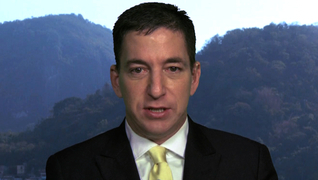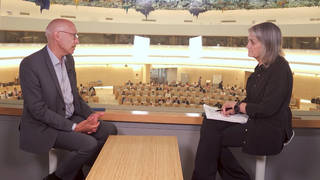
In 1981 Wise criticized President Reagan’s pardon of Mark Felt for ordering FBI agents to conduct secret break-ins. Wise said the pardon sent a “clear message to the intelligence agencies: The President of the United States approves of Government burglaries.” [includes rush transcript]
We are joined now by investigative journalist David Wise. He is the coauthor of The Invisible Government, a number one bestseller about the CIA. He is also the author of Nightmover, Molehunt, The Spy Who Got Away, The American Police State, and The Politics of Lying.
In 1981 he wrote a column in the New York Times criticizing President Reagan for pardoning Mark Felt — the man who we now know was Deep Throat.
Wise began his column by writing: “President Reagan’s pardon of two high Federal Bureau of Investigation officials who were convicted of authorizing illegal break-ins sends a clear message to the intelligence agencies: The President of the United States approves of Government burglaries.
“One can visualize the intelligence operators” breaking out the champagne at F.B.I. headquarters in the J. Edgar Hoover Building and across the river at the Central Intelligence Agency, in Langley, Va. ?”The meaning of Mr. Reagan’s action was immediately grasped by W. Mark Felt, one of the pardoned F.B.I. officials: “This is going to be the biggest shot in the arm for the intelligence community for a long time.” We are joined now by David Wise in our Washington studio.
- David Wise, the coauthor of The Invisible Government, a number one bestseller about the CIA. He is also the author of Nightmover, Molehunt, The Spy Who Got Away, The American Police State, and The Politics of Lying. David is also the former chief of the Washington bureau of the New York Herald Tribune.
Transcript
JUAN GONZALEZ: We are now joined by investigative journalist, David Wise. He’s the coauthor of The Invisible Government, a number one bestseller about the CIA. He’s also the author of Nightmover, Molehunt, The Spy Who Got Away, The American Police State, and The Politics of Lying. In 1981 he wrote a column in the New York Times, criticizing President Reagan for pardoning Mark Felt, the man who we now know was Deep Throat.
AMY GOODMAN: David Wise began his column by writing, (quote), “President Reagan’s pardon of two high Federal Bureau of Investigation officials who were convicted of authorizing illegal break-ins sends a clear message to the intelligence agencies: The President of the United States approves of government burglaries. One can visualize the intelligence operators breaking out the champagne at F.B.I. headquarters in the J. Edgar Hoover building and across the river at the Central Intelligence Agency in Langley, Virginia. The meaning of Mr. Reagan’s action was immediately grasped by Mark Felt, one of the pardoned F.B.I. officials. He said, 'This is going to be the biggest shot in the arm for the intelligence community for a long time.'” Again, that quote from a piece, an op-ed piece, that appeared in The New York Times that was written by David Wise, who is in the studio with us in Washington. Welcome to Democracy Now! It’s good to you have us with, David.
DAVID WISE: Thank you, Amy.
AMY GOODMAN: Can you talk about that moment when Mark Felt, now we know as Deep Throat was pardoned by President Reagan?
DAVID WISE: Well, I was not invited to drink any of that champagne, you can be sure. But I did feel that, given what he had been convicted of and another FBI official, Ed Miller, had been convicted of —they weren’t sentenced to jail time, they were fined a total of $8,500, I believe. And so, they weren’t going to prison, and I felt that therefore the conviction could stand because it was sending the wrong message about illegal break-ins, and in that same article, I quoted from William Pitt, the Elder, about 'the poorest man in England in his humble cottages can defy the crown,' that, you know, 'the roof may be frail and the wind may blow through it and the storm may enter and the wind may enter, but the King of England may not enter.' And that’s what the Fourth Amendment is all about. And of course, the break-ins were not defensible and they were illegal, and indeed, the two officials were convicted for that.
JUAN GONZALEZ: Well, David Wise, in some of the early reporting, there’s been suggestions that the original whistleblowing of Mr. Felt may not have been as altruistic as suggested, because he himself was upset over having been passed over for F.B.I. director after J. Edgar Hoover’s death. Your take on that?
DAVID WISE: Well, it’s very difficult to see into — I mean, do we know ourselves? Do we know anyone? Very difficult to peer into the mind of a person to know motivation. So, I’m very leery of trying to ascribe motives. He may have been — undoubtedly was — irritated and angered that he’d been passed over and that the head of the F.B.I. was L. Patrick Gray, who distinguished himself by burning evidence with the Christmas trash, important Watergate evidence. And Mark Felt must have felt that, after his career, he deserved to be named as the successor to J. Edgar Hoover. On the other hand, it’s clear from this morning’s Washington Post, where Bob Woodward is writing about how he first met Mark Felt, as a very young man — he, Woodward, was a very young man and they met in the White House where Woodward was in the Navy and was assigned to bring over some materials at the White House; Felt was waiting to see someone, and they struck up a conversation. And so, it is now clear for the first time that their relationship did not begin with the shooting of George Wallace, which Woodward had previously indicated. He called Mark Felt up when he was a young reporter about that, and then later in Watergate. It went way back to an earlier time, and so they had a continuing relationship because of this chance meeting in the White House, and Woodward’s ability to ingratiate himself with Mark Felt. So, if that’s true — and I have no reason to doubt it, and it’s all over page one of the Washington Post this morning — then it may be that Felt’s motivation was to help this young man, to whom he had taken a shine, and that was part of their long-term relationship.
AMY GOODMAN: We’re talking to investigative reporter, David Wise, who continues to do his investigations. His specialty is the intelligence agencies and cultivating sources within them, breaking news right until now. David Wise is one of those, by the way — is the person who broke the story of “Curve Ball,” who was the source — one of the sources for Powell, then Secretary of State Colin Powell’s speech at the United Nations alleging weapons of mass destruction. I wanted to go to this issue of anonymous sources, because so often Deep Throat is used an example of why they’re very important, vindicating many reporters today who use anonymous sources in a very different way, to not name government officials who basically use reporters to spread lies, like weapons of mass destruction. Your comments.
DAVID WISE: Well, let me talk a little about the “Curve Ball” matter, and tell you how it came about, and why I think it was important. This was spreading information that was true about something that wasn’t true, and what I mean is this: Last year, I was one of four writers asked by Vanity Fair magazine, which has been rather in the news these days because they broke the story of Deep Throat’s identity as Mark Felt. I was asked to participate in a story we wrote just a year ago called “The Path to War.” It was about how we got into this terrible mess in Iraq; and one of the sources that I was able to interview, I will say that it was an official of the government, and this source said to me that there was a person who was in Germany and whom the C.I.A. had not been permitted to interview by the German intelligence authorities, and that this source, later identified as “Curve Ball,” — because I didn’t know and we didn’t print his name at that time because we didn’t know it, but it later emerged he was talking about the same person we now know as “Curve Ball,” a wonderfully appropriate name for the information he provided. The information he provided which is now shown to be entirely suspect was that he had personally witnessed a production run of biological weapons, germ weapons, at a mobile laboratory inside Iraq. You remember there was a great deal of fuss about mobile laboratories, which as it turns out didn’t exist. And so, Colin Powell, in February of 2003, on the eve of the Iraq war, relied on this man, this “Curve Ball,” as our story indicated, as one of four witnesses, anonymous sources (the government was using anonymous sources) who knew something about the so-called biological mobile laboratory production, which was a fantasy that we now know it didn’t happen. Colin Powell relied on that in a speech that seemed at the time quite persuasive to many Americans. The anonymous source who told me about this, I think was doing a service to not only the readers of Vanity Fair, but anyone else who picked up that story. We now know that much of what Powell was saying wasn’t true; and in the case of “Curve Ball,” I think I’ve demonstrated that this was an important piece of information to put out to the public. And it was a source who asked me not to be named, and I had to agree, you know, when — when someone provides you with information, and says, on condition that you not name that person, you have to abide by that understanding.
JUAN GONZALEZ: And, in terms of the lessons for — the climate — political climate today and the government’s increasing expansion of its ability to conduct surveillance of American citizens, any lessons from the Watergate era that would be valuable for our listeners to grasp?
DAVID WISE: Well, I think there is a parallel between that era and the concern over terrorism today. We’ve always in this country in my lifetime have had an enemy, a perceived enemy, whether it was communism during the Cold War, then the Weather Underground that you’ve been talking about today, and now the terrorists from the Middle East. There’s always been a perceived enemy, and there’s always been a tension between the desire to protect against that perceived enemy and the freedoms that our Constitution and our way of life tries to protect; and that tension we can see now, today, with the concern over the U.S.A. PATRIOT Act, for example, and the abuses that were mentioned earlier at Guantanamo and Abu Ghraib prison. There is always a tug-of-war between the forces that want to protect our liberties and the forces that see the outside threat or the internal threat as the real problem. And really, the problem is to keep our eye on the ball, to preserve our own way of life, our own values, because if we lose that, we become just like this perceived enemy; and I remember the wonderful quote during the Vietnam era of the military officer who told a reporter, “We had to destroy the village in order to save it.” So, that I think is what we have to keep in mind.
AMY GOODMAN: David Wise, we want to thank you very much for being with us, an investigative reporter based in Washington, D.C.












Media Options